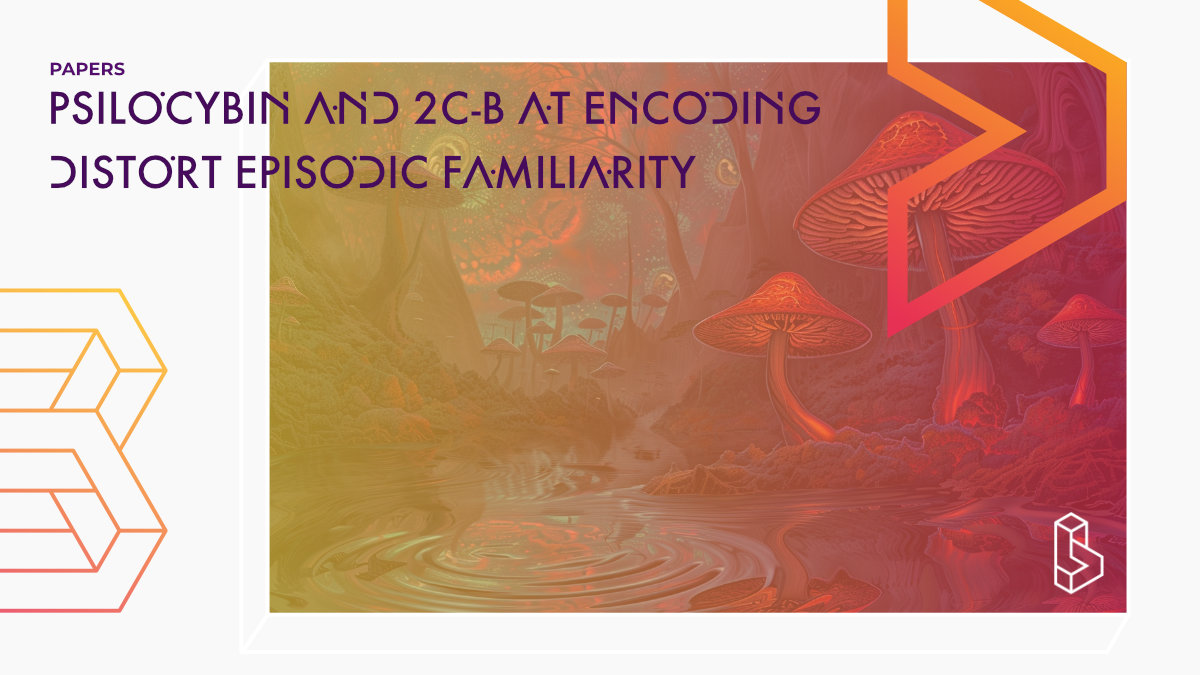This re-analysis of an RCT study (n=20) tested the acute effects of psilocybin and 2C-B on the encoding of emotional episodic memories. The study finds that both psychedelics impair estimates of recollection and familiarity, increase familiarity-based false alarms for emotional stimuli, and affect metamemory, indicating a common neurocognitive mechanism across these drugs.
Abstract of Psilocybin and 4-Bromo-2,5-Dimethoxyphenethylamine (2C-B) at Encoding Distort Episodic Familiarity
“Background: As research on psychedelics (hallucinogenic 5-HT2A agonists) progresses, it is important to delineate the reliability of supposedly unique effects across this drug class. One such effect is how psychedelics impair the formation (i.e., encoding) of hippocampal-dependent recollections (retrieval of specific details) while potentially enhancing the encoding of cortical-dependent familiarity (a feeling of knowing that a stimulus has been previously experienced).
Methods: In a double-blind, placebo-controlled, within-subjects study (N = 20), we tested the acute effects of two distinct psychedelics, psilocybin and 4-bromo-2,5-dimethoxyphenethylamine (2C-B), on the encoding of emotional episodic memories. During acute drug effects, participants viewed negative, neutral, and positive pictures. The following day (while sober), participants completed two separate memory tests for these pictures.
Results: Using computational models of memory confidence, we found trends for psilocybin and 2C-B at encoding to impair estimates of recollection that were supported by other measures/analyses. Surprisingly, psilocybin and 2C-B at encoding impaired estimates of familiarity, but these impairments were likely due to a misattribution of heightened familiarity, as both drugs at encoding selectively increased familiarity-based false alarms, especially for negative and positive stimuli. Psilocybin and 2C-B at encoding also tended to impair estimates of metamemory (understanding one’s own memory) for negative and neutral memories but enhance estimates of metamemory for positive memories, though these effects were less reliable in additional analyses.
Conclusions: Despite differences in their chemistry, pharmacology, and subjective effects, both psilocybin and 2C-B distort episodic familiarity, alluding to a common neurocognitive mechanism across psychedelics that may drive other phenomena.”
Authors: Manoj K. Doss, Pablo Mallaroni, Natasha L. Mason & Johannes G. Ramaekers
Summary of Psilocybin and 4-Bromo-2,5-Dimethoxyphenethylamine (2C-B) at Encoding Distort Episodic Familiarity
Psychedelics (hallucinogenic 5-HT2A agonists) ameliorate various psychiatric disorders and have striking effects on consciousness, yet they acutely impair cognition. Psilocybin and MDMA, however, spare or even enhance the encoding of familiarity-based memory, whereas alcohol, ketamine, and THC impair both. Although familiarity can be useful when recollection fails, it can also produce memory errors and be misattributed in bizarre ways, resulting in cognitive illusions such as false memory, false insights, the mere exposure effect, and the illusory truth effect.
A prototypical psychedelic has never been tested on emotional episodic memory, but sedatives and THC preferentially impair the encoding of emotionally negative and positive memories, and stimulants preferentially enhance the encoding of emotionally negative and positive metamemory. Here, we tested the impact of two psychedelics, psilocybin and 4-bromo-2,5-dimethoxyphenethylamine (2C-B), on the encoding of negative, neutral, and positive episodic memories. 2C-B has weaker “mystical-like” effects than psilocybin.
Methods
Find this paper
Psilocybin and 4-Bromo-2,5-Dimethoxyphenethylamine (2C-B) at Encoding Distort Episodic Familiarity
https://doi.org/10.1016/j.bpsc.2024.06.008
Paywall | Google Scholar | Backup | 🕊
Cite this paper (APA)
Doss, M. K., Mallaroni, P., Mason, N. L., & Ramaekers, J. G. (2024). Psilocybin and 4-Bromo-2, 5-Dimethoxyphenethylamine (2C-B) at Encoding Distort Episodic Familiarity. Biological Psychiatry: Cognitive Neuroscience and Neuroimaging.
Study details
Compounds studied
Psilocybin
Placebo
2C-X
Topics studied
Chemistry
Healthy Subjects
Neuroscience
Neurocognitive Disorders
Study characteristics
Original Re-analysis
Placebo-Controlled
Double-Blind
Within-Subject
Bio/Neuro
Participants
20
Humans
Authors
Authors associated with this publication with profiles on Blossom
Manoj DossManoj Doss is a researcher at Johns Hopkins University where he studies the cognitive, emotional, and neural mechanisms of psychedelic drugs.
Natasha Mason
Natasha Mason is interested in elucidating the neurobiological and cognitive mechanisms of (psychedelic) drugs by utilizing multimodal study designs, with a particular focus on substances that may hold therapeutic value.
Institutes
Institutes associated with this publication
Maastricht UniversityMaastricht University is host to the psychopharmacology department (Psychopharmacology in Maastricht) where various researchers are investigating the effects of psychedelics.
Compound Details
The psychedelics given at which dose and how many times
Psilocybin 15 mg | 1x 2C-X 20 mg | 1xLinked Research Papers
Notable research papers that build on or are influenced by this paper
The forgotten psychedelic: Spatiotemporal mapping of brain organisation following the administration of 2C-B and psilocybinThis pre-print, double-blind, placebo-controlled crossover study (n=22) investigates the neural effects of 2C-B (20mg) compared to psilocybin (15mg) and placebo using 7T resting-state functional MRI. The results reveal that both 2C-B and psilocybin reduce intra-network connectivity while enhancing between-network connectivity, with 2C-B showing less impact on certain connectivity measures but greater transmodal connectivity.
Assessment of the acute effects of 2C-B vs psilocybin on subjective experience, mood and cognition
This double-blind study (n=22) compares the effect of 2C-B (20mg) and psilocybin (15mg). It finds that 2C-B elicited alterations in consciousness of a psychedelic nature but with a shorter duration of self-reported effects than psilocybin. The study categorised 2C-B (at least at that dose) as a subjectively "lighter" psychedelic.
Linked Clinical Trial
Sub(acute) Profiling of 2C-B Versus PsilocybinThis interventional study, named PREDICT and conducted by Maastricht University, aims to comprehensively evaluate the acute and subacute effects of 2C-B compared to psilocybin and a placebo.
2C-B vs psilocybin Maastricht Study
This trial is registered with the Dutch trial registry that has been offline for over a year and hasn't been registered in any other database. We will update this record once it becomes available. All data are estimates.

